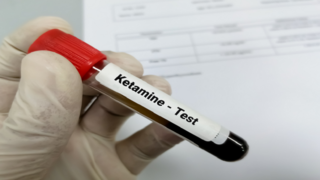ARTICLE AD BOX
Experts have sounded the alarm over controversial studies promoting the narcotic drug "ketamine" as a wonder treatment for depression, especially after billionaire Elon Musk admitted to taking it to enhance mental health.
In a heated interview with former CNN anchor Don Lemon, Musk said that taking ketamine helps him relieve mental fatigue, explaining that “those who suffer from depression should talk to their doctor about ketamine instead of SSRIs [the most common mental health medications]. common]”.
Ketamine is known as a powerful anesthetic used to prevent pain in humans during operations. It works by blocking the activity of the neurotransmitter N-methyl-D-aspartate (NDMA), which controls the functioning of the nervous system, rapidly reducing sensations, preventing pain, inducing sleep and suppressing memory.
Therefore, it is usually prescribed in small doses for non-narcotic purposes, such as treating depression, which gives patients a feeling of euphoria and hallucinations.
In the 1970s, the US Food and Drug Administration (FDA) approved the use of ketamine as a prescription anesthetic.
The World Health Organization lists ketamine as one of the "essential medicines" for anesthesia and pain management, but the FDA has not approved its use to treat psychiatric conditions.
In recent years, medical trials have been conducted to test the drug for its supposed mental health benefits, and some studies have shown promising results.
The researchers found that the compound targets neurotransmitters in the brain responsible for mood.
Last May, a study published in the New England Journal of Medicine found a clear improvement in the quality of life of adults with treatment-resistant major depressive disorder after taking ketamine.
A study published in the Journal of Clinical Psychiatry, in which 400 participants participated, found that 72% of those who used ketamine improved their mood, and 40% of them did not report any depressive symptoms after 10 doses. But the study did not monitor possible negative effects.
But experts warned against overestimating the benefits and ignoring the harmful effects. Some researchers also worry that the limited research on the use of ketamine for conditions such as chronic pain may lead doctors to overprescribe it and ignore safety risks.
In a study of 300 patients receiving ketamine, Dr. Padma Gullur, a pain specialist at Duke University, explained that more than a third of participants reported significant side effects that required medical attention, such as hallucinations, disturbing thoughts, and visual disturbances.
A study published in the British Journal of Psychiatry claimed that the FDA ignored serious side effects when approving esketamine, the most effective form of ketamine, to treat treatment-resistant depression.
They found that the pharmaceutical company Janssen submitted 5 studies to the US Food and Drug Administration, and only one had positive effects.
According to the National Library of Medicine, ketamine use by a patient with a pre-existing heart condition “can lead to disastrous results,” including “increased heart rate and blood pressure.”
Columbia University researchers found that mice given ketamine for 10 days experienced brain changes similar to those that occur in schizophrenia, a chronic and severe mental disorder that often causes patients to lose touch with reality.
.png)
 1 year ago
9
1 year ago
9









 English (US)
English (US)